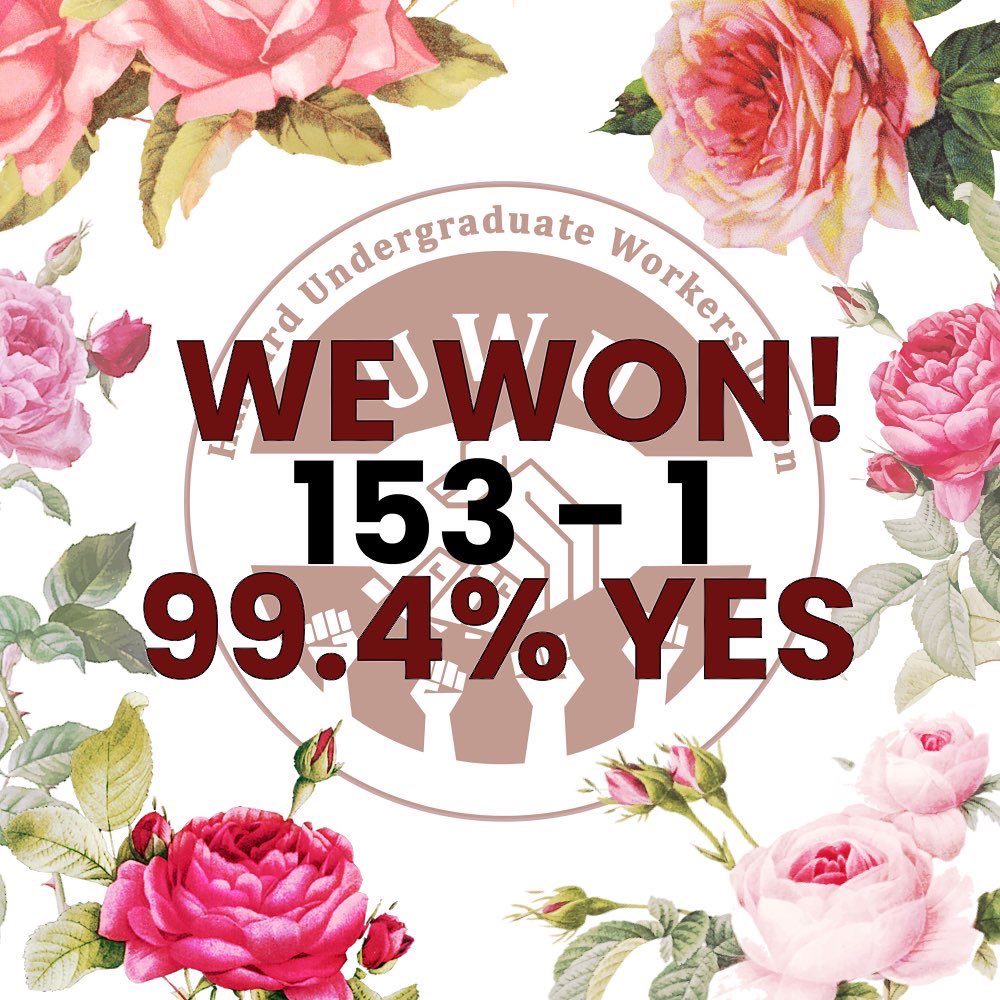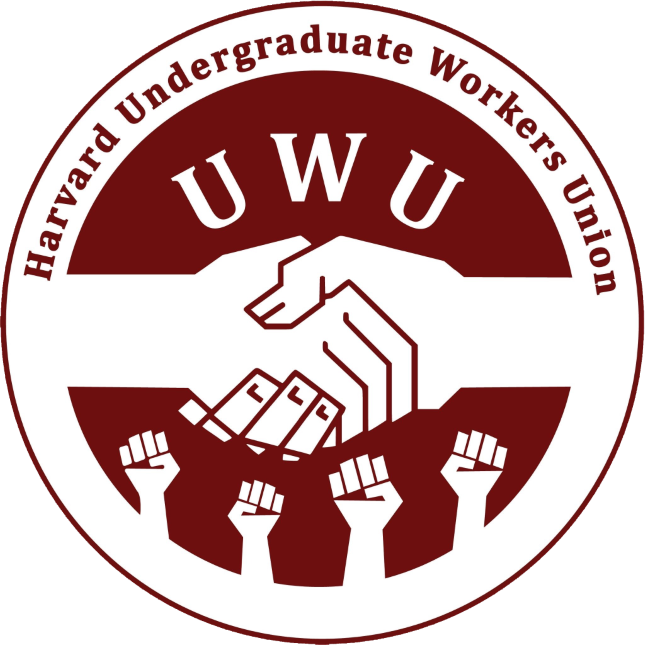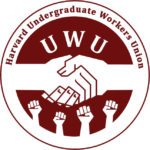Non-academic student workers organizing towards an inclusive union

We won!
Immediately after the polls closed at 4pm on Oct. 25th, the National Labor Relations Board gathered and counted the ballots from the Oct. 24 – 25th election.
Strong union support from you all means that we won DECISIVELY with 153 yes votes, 1 no vote, and 27 challenged ballots.
Even with a tight voting window and with many students working through a tough midterms season, we were able to turn out nearly half of all eligible voters.
Thank you for putting your trust and faith in your union. For now, we will rest. Be on the lookout for announcements about upcoming bargaining committee elections soon.
And thank you for tolerating all of our emails, texts, and phone calls. We’d love to hear from you if you have questions about our win, next steps, or ways that you can get involved. ❤
Interested in the Bargaining Committee?
The HUWU-UAW Bargaining Committee (BC) will negotiate the first union contract with the University on behalf of all HUWU-UAW workers. By serving on the BC, you commit yourself to building a campaign for the best possible contract.
The BC will be trained and assisted by expert negotiators in the UAW, but ultimately, all major bargaining decisions will be led and driven by membership interests. Specific responsibilities for BC members include:
- Working with organizers to survey membership needs and demands to be ratified in a union-wide vote before bargaining
- Develop and write bargaining proposals to be negotiated with the University
- Attend regular bargaining sessions with university administrators and officials
- Work with the organizers to build a public campaign around core contract demands with members and community allies
- Maintain a structure of leaders in each HUWU-UAW workplace to keep all members informed about the status of bargaining
- Make major decisions on behalf of members (e.g. Approve a tentative contract agreement, call for a strike authorization vote, etc.)
BC members should expect this to be a major time commitment. Winning a strong contract requires hard work and diligence at every step of the process. However, do note that the bargaining timeline and speed of negotiations also depends on Harvard’s bargaining team.
To run for BC, check your Harvard email and accept your nomination by responding to our notice of nomination.
FAQ
General Union Questions
The Harvard Undergraduate Workers Union (HUWU) is a group of student employees who aim to win a union for all student employees – not just teachers and researchers. We want to give all student employees a voice in deciding our pay, scheduling, hiring, and addressing many other workplace issues. We’re pushing for workplace democracy.
A labor union is an organization of employees that negotiates pay, benefits, and working conditions on behalf of its workers through a legally-binding contract. A labor union will allow us to improve our jobs and be treated as equals by management.
Our own experiences and those of our coworkers with late or inconsistent pay, workplaces closing without advanced notice, unjust firings, no clear hiring process, and low wages in many jobs have motivated us to look towards a union to protect ourselves and improve our workplaces. The big wins across higher ed unionization campaigns have also inspired us to understand the gains and wins to be had from a union. Undergraduate workers across the country from Dartmouth to Grinnell to Kenyon have unionized their workplaces, and we want to bring that power to our jobs at Harvard!
We aim to unionize all Harvard-enrolled student employees (undergraduate and graduate) working in Harvard cafes, libraries, and offices.
We dream of one day unionizing every undergraduate job on campus. For more information on unionization strategy, we hold meetings every Wednesday night at 8pm in Sever Hall 111. All workers are welcome to attend!
Plenty! Even at Harvard, undergraduate course assistants (CAs) and teaching fellows (TFs) are covered by the Harvard Graduate Students Union (HGSU) contract. At Brown University, the Graduate Labor Organization is unionized teaching assistants in computer science. At Grinnell University in Iowa, undergraduates formed a wall-to-wall union covering all undergraduate jobs. At Dartmouth University, the Student Worker Collective (SWC) recently won a contract for undergraduate dining workers. Suffice to say – undergraduates are unionizing all across the country.
Again at Dartmouth, the SWC won a whopping $21.00/hour in wages, wage increases commensurate with rising cost of attendance, and mental health and sick leave pay. In HGSU, undergraduate CAs and TF must be paid at least $20.50/hour, are entitled to paid sick leave, and must be paid for all hours worked (even if above the maximum). At Grinnell, workers have won a sweeping union covering all undergraduate workers on campus – all workers are protected under their contract. Many undergraduate unions are currently bargaining their contracts, so their big wins are yet to be seen.
Currently, we are focused on winning our union. Once we win our union, we will collectively develop a platform through a bargaining survey, bargaining goals vote, and by electing our very own union bargaining committee. Many of our members are animated by the potential for higher pay such as pay parity with course assistants, maintaining their scheduling flexibility, having a greater say in their work environment including work attire and workload, as well as reopening campus cafes that abruptly ceased to service the student population. At the end of the day, we will decide together what we bargain for.
Union Recognition
Together, we delivered a neutrality agreement to the Office of Labor and Employee Relations on April 3, 2023. This proposal lays out a process that guarantees a fair, unimpeded process to win our union. The University Administration rejected our petition on April 7, 2023 on the grounds that they’ve never voluntarily recognized a union before. We’re prepared to file a petition for recognition with the National Labor Relations Board (NLRB). However, we still strongly believe that the University should sign our neutrality agreement as proposed on April 3, 2023. We rallied for neutrality in the Yard on April 14, 2023.
As proposed, our neutrality agreement asks for the following:
- Constructive communication from the University Administration about the HUWU campaign;
- Access to employee lists at our worksites to ensure equitable representation for all student employees;
- Access to non-work areas to discuss HUWU with student employees;
- And voluntary recognition through a mutually-agreed “card check” process.
Our neutrality agreement, if agreed upon, would avoid any sort of adversarial or contentious process as may occur through a simple NLRB petition.
A voluntary recognition agreement is a document or clause that allows a union to be recognized without an NLRB process and election. We included a voluntary recognition clause in our neutrality agreement to ensure we can be certified as the representative of student library workers, student cafe workers, servers at the Queens Head Pub, and student employees at the Equity, Diversity, and Inclusion Program Offices BEFORE the end of the 2023 Spring Semester.
After filing a union election petition with the NLRB, we reached an election agreement with the University to hold an election on October 24 and 25.
Common Concerns
Joining a union isn’t an indictment of any supervisor/manager; we are asking for democratic workplaces for all workers. Forming a union and bargaining a fair contract won’t hurt your supervisor/manager — many of them are actually represented by a union and contract themselves through HUCTW! More unionized workers means a better workplace for all workers, including supervisors/managers.
Hell yeah – let’s fight to keep it that way! One benefit of a union contract is it ensures that good jobs remain good jobs. Your positive work environment can be enshrined in a contract and extended to other student workers in less-fortunate work environments. Additionally, a union contract prevents new management from making sudden, unpopular changes. Any changes to the workplace must be negotiated with our union, and changes will be approved through a democratic process run by your coworkers.
Under the National Labor Relations Act, student workers at Harvard are guaranteed the right to organize a union. Neither management nor Harvard can take any adverse action jeopardizing your job in response to a unionization effort. Any such action would result in an “Unfair Labor Practice” charge handed down by the National Labor Relations Board. More information can be found on the Board’s website.
Of course! Thousands of international student workers on visas are union organized in higher education. That includes HGSU on our campus as well as student workers at Dartmouth, Columbia, Brown, etc. All employees – no matter their immigration status – are allowed to participate in and organize a union under the National Labor Relations Act.
The U.S. Citizenship and Immigration Services cannot ask about union membership or participation. In fact, the Department of Homeland Security recently signed an agreement with the Department of Labor stating that all workers deserve fair wages and working conditions regardless of immigration status.
Logistical Questions
Yes – graduate student employees in the libraries and cafes work the same jobs as undergraduate student employees. We believe that any unionization movement should benefit all employees at a job site regardless of your degree of study.
No, undergraduate CAs and TFs will continue to be represented by HGSU-UAW and receive the benefits (a high minimum wage with regular raises, paid sick leave, etc.) guaranteed under their contract. Since HUWU is affiliated with HGSU, we plan to work together to ensure the best contracts for ALL student employees. To maximize our power and potential, we ask undergraduate instructors to please officially join HGSU using this link: https://hgsu.org/join/
No – at this time, our unit is composed of the workplaces listed above. We understand that undergraduate researchers, like all employees, have varied and unique concerns about union representation. We will work hard to ensure that all unionization efforts now and in the future are democratic and responsive to worker needs.





